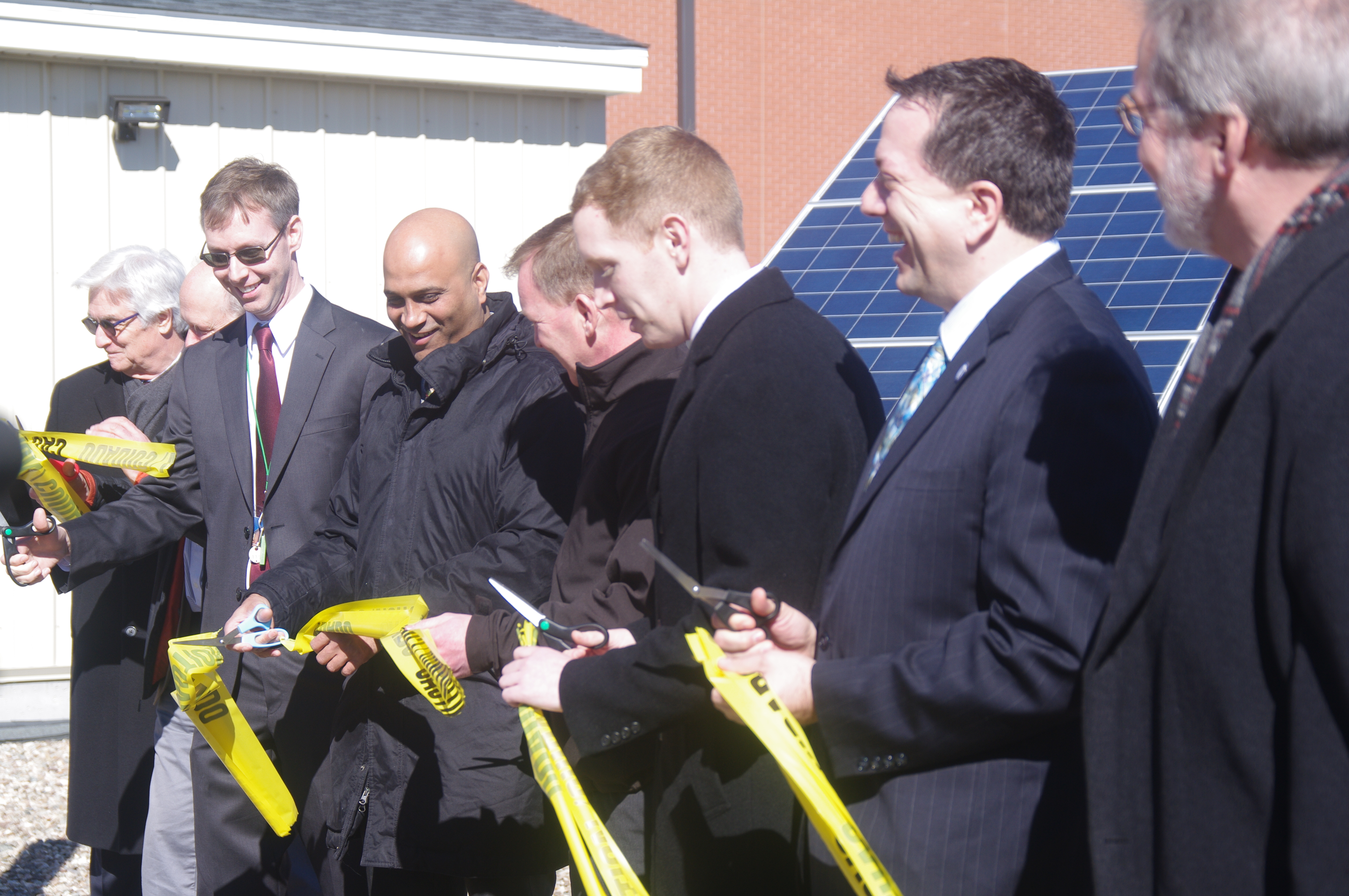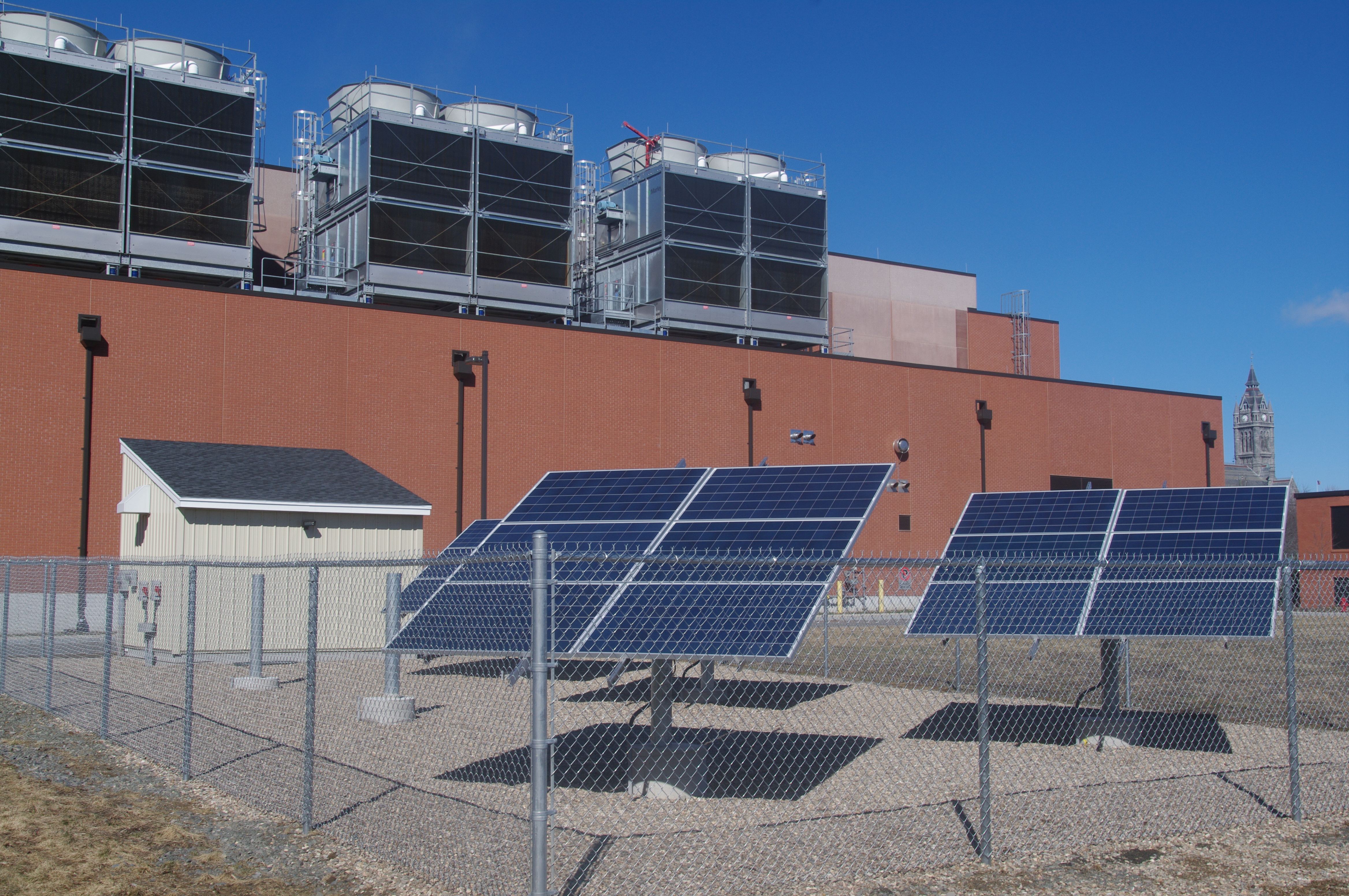
Located in the grounds of the MGHPCC, “Mass Net Zero Data Center” will facilitate research into minimizing environmental impact of high energy-using computer centers.
The Massachusetts Green High Performance Computing Center (MGHPCC), its member universities and the City of Holyoke launched the Mass Net Zero Data Center (MassNZ) -- an experimental, solar-powered, micro data center that is the first of its kind in New England, with a ribbon cutting on Friday Feb 26 2016 at the MGHPCC facility.

Left to right: Dean Tim Anderson, College of Engineering, UMass Amherst; Principal Research Engineer Christopher Hill, Director of Research Computing, MIT; Professor David Irwin, College of Engineering, UMass Amherst; Professor Prashant Shenoy, College of Information and Computer Sciences, UMass Amherst; Jim Lavelle, Manager, Holyoke Gas and Electric Department; Mayor Alex Morse, Holyoke; Representative Aaron Vega, Holyoke;
Vice Chancellor Mike Malone, Research & Engagement, UMass Amherst - Image credit: Helen Hill
“We are excited to be part of a collaboration with such enormous implications,” said Chancellor Kumble R. Subbaswamy of UMass Amherst, one of the MGHPCC’s founding institutions. “Data centers play an indispensable role in our increasingly connected world, but they are voracious users of energy. MassNZ is a hands-on research and educational resource that will help us understand how to decrease a data center’s energy footprint and increase its use of renewable energy in an era when we are striving to reduce dependence on fossil fuels.”
'Net Zero' Green Computing - UMass News
The MassNZ and MGHPCC facilities will work in collaboration with Holyoke Gas and Electric (HG&E), the municipally-owned utility that serves the City of Holyoke. The principal investigators for MassNZ are Christopher Hill, Principal Research Engineer and Director of Research Computing at the Massachusetts Institute of Technology, and Professor Prashant Shenoy of the UMass Amherst College of Information and Computer Sciences. HG&E’s participation in MassNZ is part of a distributed energy storage demonstration project undertaken in partnership with Boston-based startup Sparkplug Power.
“There are three major obstacles to research in sustainable data center design: availability of experimental infrastructure to enable realistic prototyping and evaluation, availability of realistic use cases from a state-of-the-art green data center, and real-time visibility into the utility infrastructure that provides data center power,” said Hill. “The MassNZ addresses all three.”
“Despite numerous advances in data center design, many challenges remain unaddressed,” said Shenoy. “How should a data center incorporate renewable sources of energy? How should future data centers interface with a smart electric grid to intelligently reduce their electricity bills? How should we design green HPC applications that intelligently manage power use?”
MassNZ is an extension of the Engaging-1 project, an initiative by the MGHPCC founding universities, led by Christopher Hill, that started with a $1.6M National Science Foundation (NSF) grant for a shared computing resource and has grown to support collaborations involving hundreds of researchers and students at MGHPCC founding members Boston University, the Massachusetts Institute of Technology, Northeastern University, UMass and other institutions.
“MassNZ reinforces Holyoke’s growing reputation as a leader in green energy, a hotbed of innovation and a magnet for academic and industrial investment,” said Holyoke Mayor Alex B. Morse. “It will also serve as an educational asset for local high schools and community colleges.”

The 200-square-foot MassNZ micro data center is located adjacent to the MGHPCC - Image credit: Helen Hill
The 200-square-foot MassNZ micro data center is located adjacent to the MGHPCC, a 15 megawatt, LEED Platinum data center. Solar panels located next to the micro facility provide power. Inside it are renewable cooling systems as well as batteries and micro-flywheels for energy storage. MassNZ will also house a variety of different server, storage and network systems.
Both MassNZ and the MGHPCC will generate power, cooling and workload data that will be used by researchers to investigate data center integration with a smart electric grid; machine learning-based, data-driven modeling of sustainable data centers; and the design of High Performance Computing applications that exploit novel power-management techniques. MassNZ is spurring a number of research collaborations that hope to utilize and extend its goals, in partnership with Boston University, Northeastern University and Williams College.
“MassNZ is a great example of the kind of collaboration that the founding MGHPCC universities envisioned” said MGHPCC Executive Director John Goodhue. “It also expands the ability of the MGHPCC to serve as a living laboratory for research in sustainable data center design.
More pictures from the event are online at MGHPCC's Flickr page
Partial funding for the MassNZ testbed was provided by a MGHPCC seed grant and a grant from the NSF[1]. The HG&E distributed energy storage demonstration project is supported by grants from the American Public Power Association and the Massachusetts Clean Energy Center.
[1] This work is partially supported by the National Science Foundation under Grant No. 1538918. Any opinions, findings, and conclusions or recommendations expressed in this material are those of the principal investigators and do not necessarily reflect the views of the National Science Foundation.
Press
UMass, MIT and MGHPCC built a solar power data center system WWLP/ News 22
'MassNZ': Mass Net Zero Data Center in Holyoke aims to make Green High Performance Computing Center carbon neutral The Republican
Holyoke's high performance computing center to show 'experimental' solar facility The Republican
Related
Patrick Pegus, Benoy Varghese, Tian Guo, David Irwin, Prashant Shenoy, Anirban Mahanti, James Culbert, John Goodhue, Chris Hill (2016), Analyzing the Efficiency of a Green University Data Center, ICPE’16, March 12–18, 2016, Delft, Netherlands, doi: 10.1145/2851553.2851557